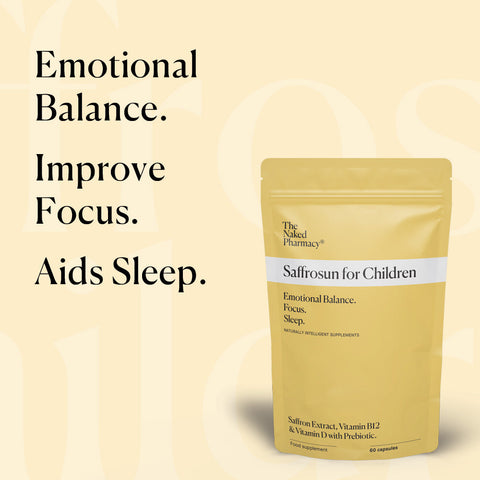Saffron — Add more spice to your life
Read on to find out how Saffron is claiming its well-earned spot within the wellness industry as one of the top therapeutic spices for the modern age.
Not to be confused for a herb, saffron is a spice that’s sourced from the stigmas of the Crocus sativus, part of the iris flower family. It’s thought to have originated in Iran which now accounts for 90% of saffron growth, thanks to its hot climate, dry summer breezes, full sunlight and semi-arid lands. Nowadays, saffron is grown in several countries, from Northern Spain to Afghanistan.
Known for its traditional medicinal qualities, saffron’s been used throughout history to tackle ailments, fight disease and even for cosmetic purposes too. Its most popular use is of course in cooking and you’ll find it in a wide range of cuisines, from Indian to Persian – for it’s colour and flavour. Saffron threads have also been used in Ancient Persian textiles, dyes and perfumes and even played a part in religious rituals.
The spice is made up of 3 carotenoid compounds - safranal, picrocrocin, crocin. Crocin is the chemical primarily responsible for the colour of saffron, safranal possesses high antioxidant levels and picrocrocin accounts for saffron’s distinctive taste.
Ayurvedic medicine, a holistic system developed in India, teaches the invigorating and nourishing self-healing components of saffron too.
Cleopatra was said to infuse her bathwater with saffron, whilst Alexander the Great used it to treat his wounds and drank saffron tea! That’s not all. The spice was used to treat the bubonic plague and Europe found itself importing large quantities to counteract the Black Death in the 14th Century.
What are the health benefits of Saffron?
Saffron’s become a bit of an all-rounder when it comes to skincare, thanks to its pharmacological qualities. It’s powerful antioxidant properties make it great for removing dirt and pollution from skin. It acts as a barrier between the skin and environmental factors like smoke and pollution.
Rich in vitamin C, it also reduces lines on the skin, lifts, firms, hydrates and brightens skin. No wonder people are swearing by it!
In terms of mental health, more and more modern scientific research is being conducted surrounding its healing properties. Research suggests that saffron can have an effect on mental health conditions, predominantly nervousness and low mood-related illness.
With approximately one in four people in the UK experiencing a mental health problem each year – people are looking for supplementary solutions and alternative therapies to help with alleviating low mood.
In a randomized and placebo-controlled trial including 60 subjects over 12 weeks, researchers found that saffron had a significant impact on anxiety and depression disorders.
Introducing Saffrosun
Our product, Saffrosun is scientifically proven to help improve symptoms of nervousness, low mood, quality of sleep and overall well being.
Wondering how? Well, the bioactive agents, crocin, safranal and picrocrocin are made up of protective phytochemicals that act as a natural anti-inflammatory and a potent antioxidant. The saffron we use in Saffrosun is carefully hand-picked, dried, milled, extracted, concentrated and tested to make sure that the correct levels of bioactives have been achieved.
Our cells produce serotonin, which is a chemical that transmits signals between nerve cells, mainly in your digestive system. Low levels of serotonin are widely thought to influence your mood, emotional wellbeing and sleep – all super important.
Research has shown saffron to have an impact on serotonin production. Saffron limits inflammation and is an antioxidant so it removes damaging agents in the body, which help to enhance the production of neurotransmitters, such as serotonin.
There has been partial research into the effects that botanical supplements can have on women experiencing menopausal symptoms too. American researchers found evidence that saffron had a positive impact on hot flushes and other symptoms, including depressive and low moods and anxiety.
Childhood and Teenage Anxiety
It’s thought that in the UK, one in ten school children have a diagnosable mental health condition. Often this manifests itself as anxiety or depressive disorders, which can affect mood and behaviour.
This makes everyday situations difficult for children in lots of ways — from concentrating at school, to socialising.
Research carried out by Murdoch University looked into the ways that saffron could potentially be used as part of a treatment plan for adolescents experiencing symptoms of depression.
An eight week study was carried out with a control group who took a placebo, and another group taking saffron supplements twice daily. Results showed that after 8 weeks, the group taking saffron were reporting lower depressive and anxiety symptoms.
Saffron could be a really useful side effect free form of treatment for low-mood and nervousness in adolescents that aren’t at a stage where medicinal intervention is appropriate.
Enter our Saffrosun for Children supplement!
Our Saffrosun for Children is a 100% natural option for children suffering with anxiety. The supplement has been proven to balance children’s moods, alleviate their anxiety and even promote better quality sleep. And it’s completely free of side effects.

How should I take Saffron?
Now we’ve touched on some of the health benefits of saffron, let’s discuss the ways that you can add this savvy spice to your lifestyle.
Get creative and add it to your cooking for a nutritional hit – perhaps a paella, a risotto or maybe your favourite curry. Alternatively, add it to water or another beverage and drink up the goodness.
You can also try adding Saffrosun to your daily latte for a caffeine fix with a twist! Experiment by adding turmeric and cinnamon to get the taste just right for you.
Saffrosun Capsules
For ultimate saffron goodness, try our Saffrosun capsules. Every batch is specified and tested, so that the minimum levels of active requirements are present. Testing is a really important part of our production process and it ensures you’re getting the very best, every time.
The quality of the saffron we pick for our capsules is the best on the market. We pick saffron from Catalonia in Northern Spain, which produces the highest strength of saffron (3.5%) with the three bioactives we’re looking for (crocin, safranal and picrocrocin). Catalonia enjoys ideal temperatures and soil conditions to grow the saffron we’re after.
Using saffron in a capsule form like Saffrosun is also really beneficial because it gets to work in the gut where lots of hormones like serotonin are produced – delivering straight to the target areas.
Does Saffron have any side-effects?
Like anything else, when you start introducing a new element into your diet or self-care routine, it’s important to do your research. Are there any adverse side-effects that you need to worry about or be aware of?
Unlike conventional medicines such as antidepressants, Saffrosun has no known side-effects. So you can take our capsules as part of a low-mood treatment plan with confidence. Saffrosun is completely safe to take alongside any conventional medicines such as antidepressants too.
Side-effects from other Low-Mood Alternatives
If you decide that medicinal treatment is the way forward for treating low mood, we’d strongly advise chatting with your GP about all available antidepressants and their side-effects. All antidepressants vary and there are a lot of different options and potential side-effects, so doing research is key.
St John’s Wort is a very common herbal treatment for low-mood, probably the most popular. Though it can be found on the high street, it does come with side effects. In the past, people have reported nausea, diarrhoea, vomiting, headaches, allergic reactions, tiredness, dizziness, confusion, a dry mouth and skin problems.
It’s important to remember that treating low-mood or mental health isn’t reliant on a singular treatment. There are lots of different factors to consider such as sleep quality, your lifestyle, diet and how much physical activity you do, to mention a few.
However, with Saffrosun, there’s scientific evidence to back-up the improvement of some of these symptoms of low-mood, such as stress, nervousness, low mood, quality of sleep and overall wellbeing.
If you need expert advice on your health condition, please contact our pharmacist on (+44) 01483 685630.
Join our Community!
If you like what you've read here, sign up to our newsletter below and receive more news, content and offers.








